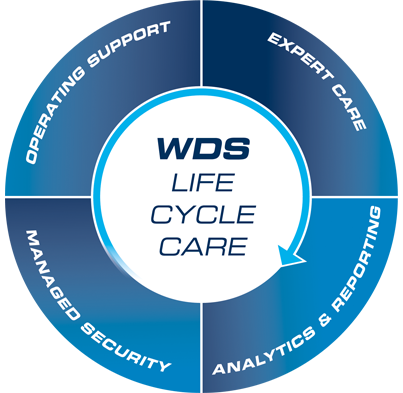General Terms and Conditions for Remote Services
Valid as per 2021
Table of Contents
- Subject of Contract / Specifications
- Online Communication and General Conditions
- Confidentiality and Data Security
- Obligations of the Customer
- Remuneration
- Service Times
- Liability for Poor Performance and Defects
- Liability
- Assignment of Rights and Duties
- Limitation Period
- Contractual Term / Termination
- Other Provisions
- Copies of Contracts
- Applicable Law, Place of Jurisdiction
These general terms and conditions shall apply to persons acting in a commercial or self-employed capacity when concluding a contract (companies).
The customer shall agree to these general terms and conditions for remote services with WINKLER und DÜNNEBIER Süßwarenmaschinen GmbH (hereinafter referred to as the “contractor”). As part of the remote services to be provided when needed, the customer shall receive support from qualified specialists. This shall be done as far as possible using online communication and data transfers. For this purpose, the customer shall ensure that trained personnel are on hand to help perform such remote services.
The contracting parties hereby agree that the customer shall remain responsible for operating the system and making any decisions related to the system. Unless explicitly agreed otherwise, the remote services shall not replace the regular maintenance and safety testing of the system.
There is no standardised practice for this type of service. Both parties shall therefore endeavour to find a joint solution by amending or supplementing the agreed provisions in the event of questions that cannot be unequivocally answered based on the information below. This also applies with regard to rapid developments in technology.
1. Subject of Contract / Specifications
1.1 Contractual Relationships
The contractor offers various types of remote services. The customer will have either concluded a LifeCycleCare contract with the contractor, which shall then be subject to these general terms and conditions, or the customer shall commission the contractor to provide remote services (on the basis of an individual order) either in writing or by phone.
The remote services shall be used to identify any faults that have arisen and determine the current state of the system using telecommunications based on the recorded data and verbal feedback. The contractor shall analyse the recorded data and processes to check for any discrepancies between the actual and target state.
1.2 Scope of Services
The services shall comprise analysis and, if possible, assistance in eliminating system faults by means of telephone advice or online connection to the system. The services may also include the evaluation of logbook data and the analysis of production processes for the purpose of process optimisation. The exact scope of the services must be defined in the specifications of the LifeCycleCare contract and its annexes or each individual order.
1.3 Functions of Remote Service Monitoring
The range of functions shall depend on the status of the system software and technical progress. The customer is aware that the range of functions shall change over time. The parties shall therefore agree on the range of functions that are currently offered by the contractor as part of its remote services, as facilitated by the technical features of the system.
1.4 Other Measures and Services
If the customer is unable to fully repair the system using the remote diagnostics provided by the contractor, the parties must agree on the next steps. If so requested by the customer, the contractor shall propose further maintenance and repair measures to ensure the intended operation of the system and shall offer the customer the appropriate assistance. A separate agreement must be concluded in such cases, unless such measures are included in the scope of the contract.
Any such services shall be provided by a technician at the request of the customer. If the contractor is justifiably held liable for defects based on another contractual relationship be-tween the parties, the contractor shall provide such services free of charge; otherwise the contractor shall charge an additional fee for the services in question according to the con-tractor’s current rates and based on the contractor’s current terms and conditions for installa-tions in Germany and abroad. In this respect, spare parts shall be delivered exclusively on the basis of the latest version of the contractor’s general terms and conditions of sale and delivery.
1.5 Service Limitations
If the discrepancies described in section 1.2 are caused by external force, freak accidents, improper use, failure to observe the installation and environmental conditions specified by the manufacturer, insufficient or incorrect maintenance, force majeure or contamination for which the contractor is not responsible, and if such faults are not caused by the functioning of the system, the contractor shall only be obliged to provide the services specified in section 1.2 of this contract – or the further measures and services specified in section 1.3 of this contract – for an additional fee based on the contractor’s current rates. This shall particularly apply even if a flat-rate price has been agreed or if the faults in question are to be rectified within the scope of another contractual relationship between the contracting parties.
The contractor shall assume the obligations detailed in this contract. The contractor shall assume no guarantee for the diagnosis and repair of all system damage and faults through the use of remote services, nor shall the contractor guarantee the subsequent functionality of the system.
2. Online Communication and General Conditions
2.1 Technical Requirements
The remote services shall be provided via a telephone and/or Internet connection. The customer must provide and maintain the necessary telecommunications free of charge (Internet connection according to the contractor’s specifications).
As regards the additional requirements, the system and its software must be in a technically flawless, maintained condition and the customer must not have made any changes to the installed system software without the contractor’s consent. The system software must be up to date with regard to the installed online diagnostics module from the contractor.
The contractor shall also be entitled to transfer the logbook data used for diagnostics via online access.
2.2 Data Transmission Paths
Die Parteien sind jeweils für den Betrieb und die Instandhaltung Ihrer Systeme verantwortlich. Beim Ausfall des Datenübertragungsweges zwischen dem Auftraggeber und Auftragnehmer, insbesondere durch Störungen in den Übertragungswegen, sowie bei fehlenden oder unzureichenden Daten, ist der Auftragnehmer von seinen Leistungspflichten gemäß der Ziffer 1.2. dieses Vertrages befreit.
3 Confidentiality and Data Security
3.1 Usernames and Passwords
The customer must ensure that assigned usernames and passwords are only shared with authorised persons.
3.2 Confidential Handling of the Customer’s Data
The contracting parties hereby agree that all data and other information belonging to the customer which is exchanged within the scope of the remote services (e.g. production secrets, relevant data on products) may only be used for the services defined in this contract. The contractor shall be prohibited from marketing such information for its own account and from passing on such knowledge to third parties. However, the contractor shall be entitled to use such information to improve its own products and services.
3.3 Antivirus Protection
The contracting parties shall take appropriate precautions in line with the latest technical developments to prevent their software from being compromised by viruses and other malware. If one of the contracting parties is compromised by viruses and other malware which may affect the remote services or which may be transferred to the other contracting party’s systems, the other contracting party must be immediately informed in writing.
3.4 Back-Ups
The customer must use the latest technology to back up data at regular intervals. If the customer fails to back up data using the latest technology, the contractor shall not be liable within the scope of the contractual agreements, in particular within the scope of section 8 of this contract, for the recovery of any data that is lost due to the contractor’s failure to back up data using the latest technology.
4. Obligations of the Customer
4.1 Initialisation Mode
If necessary, the customer shall activate remote services with a phone call. The contractor shall then connect to the system installed on the customer’s premises.
4.2 Assistance with Error Messages
When identifying, narrowing down, reporting and describing errors, the customer must follow the instructions issued by the contractor. If necessary, the customer must use set-up instructions / check-lists provided by the contractor.
The customer’s cooperation shall be required to rectify the issue. The customer must ensure that trained personnel are available for this purpose. If anything is unclear, additional information and documents must be sent to the contractor.
4.3 Responsibility for Health and Safety
In cases in which the remote services may pose a risk to people or property, the customer must assume responsibility for health and safety by confirming that the intended measure can be performed safely. If this cannot be confirmed for every system on site, the customer must reliably secure such systems to prevent personal injury and property damage. In particular, the customer must ensure that no persons are endangered – in any way or at any stage – when performing the services on site.
4.4 Training / System Maintenance
The customer agrees to regularly and adequately teach its specialist staff how to use the technical facilities required for the remote services (e.g. service terminal, set-up instructions, basic mechanical settings). In addition, the customer agrees to maintain the system in accordance with the manufacturer’s requirements and in line with the latest technology. The contractor shall assume no liability for any impairments in the service that are caused by the customer’s failure to properly maintain the system.
4.5 Reporting Obligations of the Customer
Any modifications that the customer makes to the system or its environment must be communicated to the contractor in writing if they may affect the agreed remote services.
4.6 Storage of Data
The customer agrees to create back-up copies of all data before requesting remote services in accordance with section 1.2 of this contract.
4.7 Assumption of Costs
The costs associated with the obligations stipulated in section 4 of this contract shall be borne by the customer. Similarly, the customer shall bear the connection fee for the telecommunications used.
5 Remuneration
The remuneration shall be calculated based on the provisions of the LifeCycleCare contract and its annexes or each individual order.
6 Service Times
6.1 Availability of Remote Services
The contractor agrees to keep the agreed services available on weekdays (Mondays to Fridays) between the hours of 7 am and 5 pm (CET). The hotline shall not be available at weekends (Saturdays and Sundays) or on any public holidays that are scheduled according to the Public Holiday Act of the State of Rhineland-Palatinate (LFtG) in Germany.
The remote services shall only be available outside these hours if such additional availability is agreed in the LifeCycleCare contract. The details shall be explicitly agreed in the relevant contract and its annexes.
Likewise, fixed response times shall only be guaranteed in a LifeCycleCare contract and shall be defined in the relevant contract and its annexes. Therefore, the contractor shall not be able to guarantee immediate availability in the case of an individual order.
6.2 Force Majeure
If the provision of services is delayed – or delayed further following an initial delay – due to force majeure (e.g. epidemics, wars, civil wars or similar conflicts and impending situations) or due to measures taken as a result of labour disputes (e.g. strike and lockout) or due to the occurrence of situations that are not caused by the contractor, the services may be provided within a reasonable period once the relevant events have subsided, provided such incidents have prevented the timely performance of the services. In important cases, the contractor shall notify the customer of the occurrence and expected duration of such events. The services shall also be postponed for a reasonable period if the customer is in arrears with a certain payment or if the customer defaults on any other contractual obligations.
6.3 Delay
If the customer incurs damage as a result of a delay caused by the contractor, the customer shall be entitled to claim compensation for the delay. The compensation for a delay shall amount to EUR 100.00 / hour within the scope of the remote services described in section 1.2; however, the total compensation for all delays shall be limited to EUR 500.00 for each individual order or for each remote service assignment in the case of LifeCycleCare contracts. If the customer sets the contractor a reasonable grace period to perform the services (taking into account the exceptional cases stipulated by law), and if this subsequent deadline is not met, the customer may withdraw from the individual order. If a LifeCycleCare contract has been concluded, the customer may terminate the contract if this is justified in consideration of the interests of both parties.
The parties shall have no further claims – without prejudice to the provisions of section 8.3.
7 Liability for Poor Performance and Defects
7.1 Rectification Measures
The contractor shall provide the services according to the generally accepted professional practice. If the services are not performed completely or properly, they must be rectified by the contractor free of charge.
7.2 Reduction of Remuneration and Termination
If the contractor fails to fulfil its obligation to rectify the issue, the customer shall be entitled to set a reasonable grace period. If this grace period elapses to no avail, the customer may reduce the agreed remuneration or withdraw from the individual order. If a LifeCycleCare contract has been concluded, the customer may terminate the contract if this is justified in consideration of the interests of both parties.
7.3 Compensation for Damages and Reimbursement of Wasted Expenses
The contractor shall be liable for other damages and wasted expenses in accordance with the provisions of section 8 of this contract.
8 Liability
8.1 Direct Damage
The contractor must repair any damage to the remotely serviced systems which is caused by the actions of the contractor or its vicarious agents – free of charge up to twice the amount of the individual order. This shall also apply to any damage that arises as a result of demonstrably inadequate repairs or other commissioned work on the systems in question. In the case of LifeCycleCare contracts, the relevant contractual provision shall apply.
8.2 Limitation of Liability
The customer shall not be entitled to assert any further claims for damages or the reimbursement of wasted expenses against the contractor beyond the rights and claims granted within the scope of the LifeCycleCare contract or individual order – including any claims resulting from inadequate or incomplete advice – regardless of the legal reason argued by the customer. This particularly applies to any consequential damages such as lost profit, financial damage and third-party claims (this is not an exhaustive list). In particular, the contractor shall assume no liability for faulty data lines, damaged data, lost data, transmission errors or misconduct on the part of the customer.
8.3 Liability of the Contractor
Without prejudice to the provisions stipulated in section 6.3 (delay) and sections 8.1 and 8.2, the contractor shall be held liable for:
a) The intentional or grossly negligent actions of its owners, administrative bodies and vi-carious agents;
b) Culpable injury to life, limb or health;
c) The culpable breach of essential contractual duties (but limited to the typical degree of damage that could be foreseen when the contract was concluded);
d) The fraudulent concealment of defects; and
e) The express assumption of a guarantee for the quality of an item.
The exclusion of liability shall not apply if compensation is paid out by the business liability insurance provider of the contractor or customer. This shall be based on the general terms and conditions for liability insurance.
The limitations of liability indicated above shall have no bearing on any claims made in ac-cordance with the German Product Liability Act (ProdHaftG).
9 Assignment of Rights and Duties
The contractor shall be entitled to assign its rights and duties under this contract to third parties.
10 Limitation Period
Any rights and claims arising for the customer under this contract due to poor performance or defects shall expire after 12 months, as calculated from the termination of the respective service. The limitation period shall be extended by the time it takes to rectify the services or remedy the defects. Any claims arising from the situations described in section 8.3 of this contract shall be subject to the statutory limitation periods.
11 Contractual Term / Termination
11.1 Extraordinary Termination
Both parties shall be entitled to terminate the contract for good reason.
11.2 Consequences of Termination
Im Falle einer Kündigung wird nach Ende des Vertrages kein Remote-Service mehr erbracht. Das Erbringen solcher Leistungen erfordert jeweils eine erneute ausdrückliche Vereinbarung in Form eines neuen LifeCycleCare-Vertrags oder eines Einzelauftrags.
12 Other Provisions
12.1 Inclusion of Other Terms and Conditions
If the LifeCycleCare contract, the individual order or these general terms and conditions for remote services do not contain any provisions for a certain eventuality, they shall be supplemented by the latest versions of the contractor’s general terms and conditions of sale and delivery and the contractor’s terms and conditions for installations in Germany and abroad.
12.2 Side Agreements and Amendments
Any side agreements or amendments to these general terms and conditions for remote services shall only become effective if they are agreed in writing. If individual provisions of these general terms and conditions are worded inaccurately, both parties shall endeavour to find a wording that reflects the intentions of both parties.
12.3 Severability Clause
If individual provisions of these general terms and conditions prove to be partially ineffective or incomplete, this shall have no bearing on the validity of the remaining provisions.
13 Copies of Contracts
In the case of LifeCycleCare contracts and individual orders that are drawn up in German and English or another language, the German version shall apply. The version in the other language shall merely be a duplicate for the contracting parties to read.
The parties shall communicate in German or English. This particularly applies to the remote services to be provided by the contractor.
14 Applicable Law, Place of Jurisdiction
The contractual relationships shall be subject to German law to the exclusion of the United Nations Convention on Contracts for the International Sale of Goods (CISG).
The contractor’s local courts shall be the place of jurisdiction. However, the contractor may also take legal action through the customer’s local courts.








 Deutsch
Deutsch  English
English  Русский
Русский